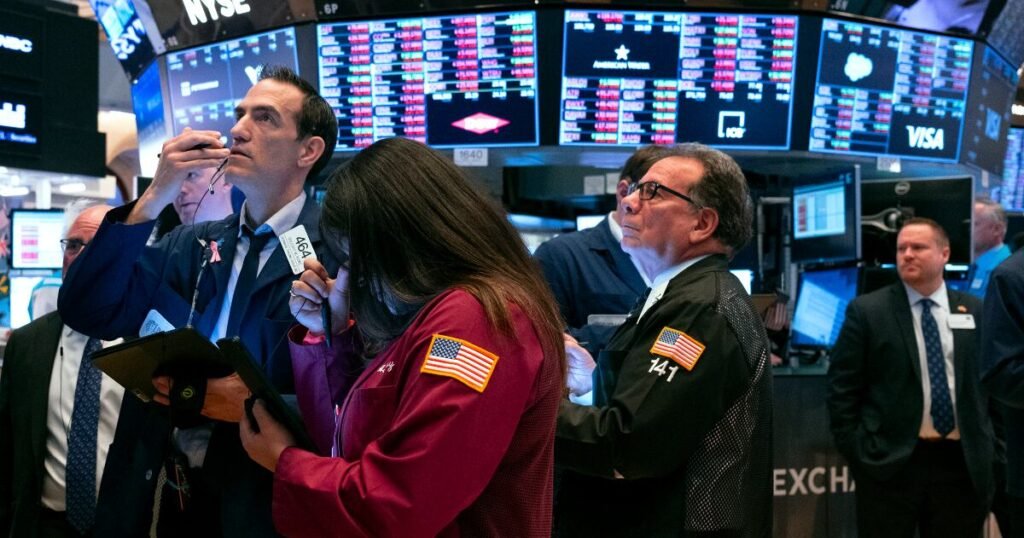Overview of the Market Surge

In recent days, the U.S. stock market has witnessed an unprecedented surge, with major indices reaching record highs on Wednesday. This remarkable uptick has been led by the Dow Jones Industrial Average, which experienced a substantial gain of approximately 2.5%, reaching an all-time high of over 36,000 points. Similar trends were observed in the S&P 500, which rose by about 2.3%, and the NASDAQ composite, showing a robust increase of 2.8%. Such significant percentage gains across these three major indices reflect a positive shift in market dynamics, captivating the attention of investors nationwide.
Several key factors have contributed to this remarkable movement in the stock market. Firstly, the announcement of favorable economic indicators, including lower unemployment rates and increased consumer spending, has instilled confidence among investors. Additionally, the recent political landscape, particularly the anticipated political comeback of former President Donald Trump, has sparked considerable interest. Many investors have perceived this development as a potential catalyst for pro-business policies that could further stimulate economic growth.
Investor sentiment has also shifted positively, with many expressing optimism about the potential implications of Trump’s return to the political arena. This renewed confidence in the market is evident in the increasing trading volumes and heightened activity amongst retail investors. Analysts suggest that the combination of bullish economic data combined with the prospect of a politically favorable environment has created a compelling narrative that encourages investment.
As investors navigate this period of volatility, understanding the interrelationship between political events and market performance will be crucial. The current stock market surge not only reflects economic indicators but also the significant impact of political developments on investor confidence and sentiment, ultimately influencing market trends moving forward.
The Implications of Trump’s Return to Power
Donald Trump’s potential return to the presidency presents a host of implications for the economy and financial markets. A key aspect of Trump’s presidency was characterized by significant tax cuts, deregulation, and shifts in trade policies. Analysts predict that, if reinstated, he may reintroduce these initiatives, which could have a transformative impact on various sectors of the economy.
One of the primary policies likely to surface is the continuation of tax cuts. His previous tax reforms were aimed at stimulating business investment and consumer spending. If similar tax measures are enacted, sectors such as technology, healthcare, and financial services may see a notable boost. However, the long-term implications would depend on other factors, including deficits and potential shifts in public sentiment toward tax fairness.
Deregulation is another cornerstone of Trump’s economic strategy that could be revived. The deregulation of energy, banking, and environmental policies may spur growth in certain sectors, particularly fossil fuels and traditional manufacturing. However, this approach may also raise concerns among environmentalist groups and could provoke legal challenges. Increased regulatory scrutiny has often been a response to deregulation, making the potential for conflict in public policy evident.
Moreover, Trump’s trade policies, especially those focused on tariffs and trade agreements, could shift market dynamics significantly. Returning to a more protectionist stance may benefit domestic industries in the short term, but could also lead to retaliatory measures from trading partners, affecting international trade relations.
From an investment perspective, institutional investors may become more cautious, while retail investors might react with enthusiasm to anticipated tax and regulatory reforms. Market expectations will likely fluctuate as different sectors respond to these potential policies, with financial markets keenly observing the pathways Trump may choose in his renewed political strategy.
Political Landscape and Market Reactions
The political landscape following Donald Trump’s recent political comeback has triggered a notable response from financial markets. Analysts and economists have observed a surge in stock market indices, suggesting an optimistic outlook among investors regarding Trump’s potential policies. The prevailing sentiment points towards a belief that Trump’s leadership style may be conducive to pro-business initiatives, which could further stimulate economic growth.

In discussions across financial news platforms, market analysts have pointed to key sectors that are likely to benefit under a Trump administration, including energy, finance, and healthcare. These sectors often respond positively to deregulation and tax reforms, which have historically been central to Trump’s agenda. Public opinion appears to align with this optimism to a degree, with many voters expressing support for economic strategies aimed at fostering growth and job creation.
However, this enthusiasm is tempered by uncertainties regarding the feasibility of Trump’s policies amidst a politically divided Congress. Experts have raised concerns about potential challenges Trump could encounter in implementing his proposed legislative agenda. The complexities of bipartisanship in a split legislature may hinder swift action on tax cuts or trade reforms, resulting in prolonged market volatility.
Furthermore, some economists caution against the risks associated with an aggressive economic strategy. Possible repercussions could include heightened inflation or increasing national debt, which might affect long-term growth prospects. Analysts also highlight the need for vigilance due to external factors, such as global economic shifts or geopolitical tensions, which could complicate Trump’s approach to international trade and investment.
Thus, while the market reactions to Trump’s comeback appear initially favorable, the overarching implications for the economy necessitate a careful examination of both the political climate and its potential impact on investor confidence. This balance of optimism and caution will be crucial for navigating the financial landscape in the coming months.
Future Trends in the Stock Market
The stock market is a dynamic environment influenced by numerous factors, particularly when a prominent political figure like Donald Trump re-emerges on the political landscape. Historically, Trump’s presidency was marked by significant fluctuations in the stock market, often driven by his policy decisions, economic regulations, and international relations. As we analyze the potential future trends in the stock market amid his renewed presence, it is essential to consider several pivotal economic indicators that could shape market performance.
Firstly, interest rates play a crucial role in determining stock market dynamics. The Federal Reserve’s monetary policy, particularly regarding interest rate adjustments, can substantially impact investor sentiment and corporate borrowing costs. If rates are kept low, it could encourage investment in equities, leading to price increases. Conversely, a rise in rates may prompt investors to reassess their portfolios, potentially leading to a bearish market.
Inflation is another critical factor that merits attention. In recent years, concerns regarding rising prices have dominated financial discussions. Should inflation continue to rise, it could put pressure on consumer spending, thereby affecting corporate earnings and stock performance. Analysts are closely monitoring inflationary trends as they can signal market volatility or stability.
Global economic conditions also play a significant role in future stock market trends. Factors such as international trade relations, commodity prices, and geopolitical stability influence investor confidence and market performance. Trump’s previous administration saw a distinct approach to international trade, which could resurface, impacting various sectors and their stock valuations.
Financial analysts’ predictions regarding stock market trajectories remain varied, with many suggesting a cautious optimism. Some experts recommend seeking investment opportunities in sectors likely to benefit from Trump’s possible economic policies, such as infrastructure and manufacturing. This cautious outlook acknowledges both the opportunities and inherent risks associated with stock market investments as Trump’s political comeback unfolds.